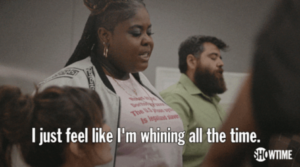Transcript
Hi everyone, I hope you're well and ready for a new French video.
Today we're going to take a look at a French expression in just a few minutes. The expression we're going to look at today is a colloquial expression.
This expression is "it's seen and seen again".
I love using this expression, I use it very often.
We use it to talk about something that's not very original, we say c'est vu et revu. So, it means that it's really not original, we've seen it lots of times before. It's not something new or innovative.
For example, if I'm watching TV and I see an ad with a story I've seen 10 times before, for example for laundry products, I can tell it's been seen over and over again, they should change the story a bit.
We use it to say that an idea is a bit lame, that we've seen it everywhere before, that it's been done lots of times before.
Here's some more context.
For example, if I say I don't have any ideas for a present for my boyfriend.
A friend might say, you could buy her a perfume. I'm going to say oh no, not a perfume, it's seen and seen again.
That means it's really a very basic gift that anyone can make. Here's a second context. If I'm having guests over and I need to find a dessert to make, and my husband says we could make an apple crumble for dessert, I can say oh no, it's seen and seen again, crumbles are seen all the time, I'd like to make a dessert that's a little more original.
I'll give you one last bit of context that I saw on Instagram.
There's an Instagram account called Vinted Ball Breakers.
Casse-couille is a very vulgar expression in French, it's a synonym for boring, so boring people. So here, in fact, is a list of people who are boring on Vinted.
So you see, this is the network where you can buy and sell clothes.
Here, we have a conversation between a seller and a buyer and the person who wants to buy does not make any sentence.
She only answers with very small words.
And so, the saleswoman asks her if she can't make sentences. And so, you see, here, it's repeated on the group and the description of this image, it's people making sentences, it's seen and seen again.
Here, of course, it's ironic. It's second-degree. It's to say why do what everyone else does. We've already seen these phrases a bunch of times, so you might as well be a little more original in your writing, as I'm telling you, it's ironic, it's humor.
I hope you've understood this little colloquial expression and that you'll be able to use it too.
If you liked this video, of course, think of putting a like. And if you're new, subscribe so you don't miss any of my videos, I'll see you very, very soon.








